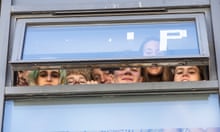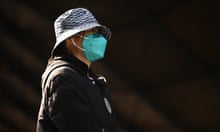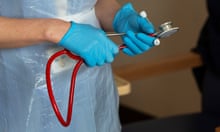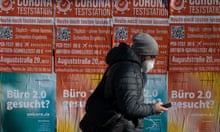Newly released genetic data gathered from a live food market in Wuhan has linked Covid-19 with raccoon dogs, adding weight to the theory that infected animals sold at the site started the coronavirus pandemic, researchers involved in the work say.
Swabs collected from stalls at the Huanan seafood market in the two months after it was shut down on 1 January 2020 were previously found to contain both Covid and human DNA. When the findings were published last year, Chinese researchers stated that the samples contained no animal DNA.
That conclusion has now been overturned by an international team of scientists. Their analysis of gene sequences posted by the Chinese team to the scientific database Gisaid found that some of the Covid-positive samples were rich in DNA from raccoon dogs. Traces of DNA belonging to other mammals, including civets, were also present in Covid-positive samples.
The discovery does not prove that raccoon dogs or other animals infected with Covid triggered the pandemic, but scientists presenting the work to an expert group at the World Health Organization on Tuesday believe it makes that more likely.
“The data does point even further to a market origin,” Prof Kristian Andersen, an evolutionary biologist at Scripps Research in La Jolla, California, told Science magazine. Andersen attended a meeting of the WHO’s scientific advisory group for the origins of novel pathogens and is working on the data.
The recently uploaded gene sequences were spotted by Florence Débarre, an evolutionary biologist at the French National Centre for Scientific Research. She alerted Andersen and Prof Michael Worobey, an evolutionary biologist at the University of Arizona, who have both written papers providing evidence of a market origin for the pandemic.
What started the worst pandemic in a century has become the focus of intense – and often toxic – debate. One theory proposes that the virus emerged in wild animals and spread to humans through contamination at the market. Another suspects it escaped from the nearby Wuhan Institute of Virology, where researchers work on similar pathogens.
The lab leak theory has gained headlines in recent weeks after an intelligence assessment from the US energy department and Republican-led hearings into the origins of the pandemic. Concrete evidence is lacking for either theory and may never be found.
The latest genetic data does not prove raccoon dogs or other mammals were infected with Covid and spread it at the market. If the animals were infected, they may have contracted the virus from infected humans. But the findings do point to the possibility that the cause was an infected animal and, ultimately, the illegal wildlife trade.
While scientists expect the debate to rumble on, there are questions over why the Chinese team did not release the genetic data earlier. One member of the team, George Gao, the former head of China’s Centres for Disease Control and Prevention, told Science there was “nothing new” in the sequences. Why the data was later pulled from the Gisaid site is also not clear.
Débarre said she was working on a report of the findings, which will be made public, and would answer questions only once that was done.
Dr Jonathan Stoye, a virologist and senior group leader at the Francis Crick Institute in London, said: “The finding of Sars-CoV-2 infected racoon dogs strengthens the plausibility that coronavirus-infected farmed animals were an important link in the series of events leading to the Covid-19 pandemic.
“However, it does not disprove lab-leak theories: that would require the demonstration that such animals were infected prior to their arrival and display at the Huanan seafood market, something that may never be possible.”
Also on Friday, the WHO said the Covid-19 pandemic could settle down this year, posing a risk similar to that of flu.
“I think we’re coming to that point where we can look at Covid-19 in the same way we look at seasonal influenza: a threat to health, a virus that will continue to kill, but a virus that is not disrupting our society,” Michael Ryan, the WHO emergencies director, said, adding: “I believe that that will come … this year.”










